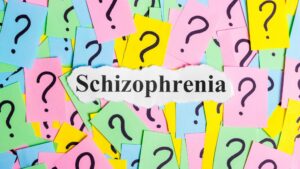What is Schizophrenia ?
 Schizophrenia is a serious mental condition in which people have an aberrant interpretation of reality. Schizophrenia can include hallucinations, delusions, and profoundly disturbed thought and behaviour that interferes with everyday functioning and can be debilitating. In most of the cases treatment is required for the rest of their lives. Early therapy may help reduce symptoms before major issues arise, improving the long-term outlook.
Schizophrenia is a serious mental condition in which people have an aberrant interpretation of reality. Schizophrenia can include hallucinations, delusions, and profoundly disturbed thought and behaviour that interferes with everyday functioning and can be debilitating. In most of the cases treatment is required for the rest of their lives. Early therapy may help reduce symptoms before major issues arise, improving the long-term outlook.
Symptoms of Schizophrenia
 The symptoms of schizophrenia emerge gradually over time. You may see indicators as early as your adolescence, such as
The symptoms of schizophrenia emerge gradually over time. You may see indicators as early as your adolescence, such as
- A substantial reduction in academics or work performance.
- Having difficulty thinking clearly or focusing.
- Developing paranoid ideas or being distrustful of others.
- Spending an increasing amount of time alone.
- Having innovative, impassioned ideas that others find unusual.
- Having weird sensations or appearing to have no sentiments at all.
- Having little or no concern in their appearance.
- Tough to discern what’s genuine and what isn’t.
- Positive signs: They do not perceive reality in the same manner that others do. They may also be able to see, hear, smell, or taste things that others are unable to.
- Negative signs and symptoms : These are items that are noticeably missing from their lives. They have lost interest and enthusiasm in doing most things, including meeting friends and going about their regular lives.
- Symptoms of cognitive impairment : They have difficulty paying attention, concentrating, and recalling information.
Causes
It is unknown what causes schizophrenia, but experts believe that a combination of genetics, brain chemistry, and environment all have a role in the disorder’s development. Problems with naturally occurring brain chemicals, such as neurotransmitters like dopamine and glutamate, may have a role in schizophrenia. Neuroimaging studies demonstrate that patients with schizophrenia have different brain structures and central nervous systems. While scientists are unsure of the importance of these alterations, they do suggest that schizophrenia is a brain disorder.Risk elements of Schizophrenia
Although the exact origin of schizophrenia is unknown, many variables appear to raise the likelihood of acquiring or triggering schizophrenia, such as:- Having a history of schizophrenia in one’s family
- Some pregnancy and delivery issues, such as starvation or exposure to chemicals or viruses, may have an effect on brain development.
- Using mind-altering (psychoactive or psychotropic) medications as an adolescent or young adult
Complications of Schizophrenia
 If left untreated, schizophrenia can cause major issues in all aspects of one’s life. The following are complications that schizophrenia may cause or be connected with:
If left untreated, schizophrenia can cause major issues in all aspects of one’s life. The following are complications that schizophrenia may cause or be connected with:
- Suicide, suicide attempts, and suicidal ideation
- Anxiety and obsessive-compulsive disorders (OCD)
- Depression
- Alcohol or other substance abuse, including nicotine
- Inability to work or go to school
- Financial difficulties and homelessness
- Isolation on a social level, as well as health and medical issues
- Victimization
Types of Psychotherapy :
- Individual psychotherapy.
- Cognitive behavior therapy (CBT)
- Cognitive enhancement therapy (CET).
Psychosocial Therapy :
If a person with schizophrenia improves during psychotherapy sessions, it is probable that they may want more assistance in learning how to be a part of a community. This is where psychosocial treatment comes into play.- Rehabilitation : Schizophrenia frequently manifests itself during the years when we are establishing our jobs. As a result, rehabilitation may involve career counselling, problem-solving assistance, and financial education.
- Education in the family : Your understanding of psychosis and schizophrenia can aid a friend or family member who is suffering from it. According to research, those with schizophrenia who have a strong support system do better than those who do not have the encouragement of friends and family.
- Self-help organisations : You should urge your loved one to continue working on their social skills by enrolling them in community care and outreach programmes.
- Assertive community treatment (ACT) : This programme provides highly individualised assistance to assist persons with schizophrenia in dealing with day-to-day issues such as medication administration. ACT specialists also assist people in dealing with difficulties in a proactive manner and working to avert catastrophes.
- Social recovery therapy : This treatment focuses on assisting the client in setting and achieving objectives, as well as developing a feeling of optimism and positive ideas about oneself and others.
Medication for Psychosis :
 Newer antipsychotic drugs are also known as second-generation or atypical antipsychotics. They are more recent than first-generation medications. They have less adverse effects than previous antipsychotics, such as repetitive or involuntary motions like eye blinking. Among the medications are:
Newer antipsychotic drugs are also known as second-generation or atypical antipsychotics. They are more recent than first-generation medications. They have less adverse effects than previous antipsychotics, such as repetitive or involuntary motions like eye blinking. Among the medications are:
- Risperidone ( Restonorm, Risdone, Risperdal, Zisper, Sizodon)
- Olanzapine (Oleanz, Olet, Olimelt)
- Quetiapine (Quel, Qutan )
- Aripiprazole ( Arpizol, Arip, Nulet )
- Paliperidone
- Lurasidone (Luramax, Lurata)
- Asenapine
- Brexpiprazole
- Cariprazine
- Clozapine
- Iloperidone
- Paliperidone
- Ziprasidone
- Chlorpromazine
- Fluphenazine
- Haloperidol
- Loxapine
- Pimozide
- Thiothixene
- Trifluoperazine
Schizophrenia Treatment In Nagpur
 Mind & Mood Clinic, Nagpur provides expert treatment for schizophrenia, which may involve a combination treatment regimen of medication, counselling, and therapy. These will be prescribed and supplied based on your own needs throughout time, such as whether you respond well to a certain type of medicine or whether your symptoms have improved as a result of talking therapy.
Our overarching goal is to assist and support your independence while also attempting to enhance your quality of life by recognising and working with you to prevent the events or conditions that trigger the symptoms. The majority of persons with this illness improve with treatment and assistance. Exercising, eating nutritious meals, managing stress, and staying in touch with loved ones are all important. Maintaining your mental and physical strength might help you feel more in control of your condition and your life.
Mind & Mood Clinic, Nagpur provides expert treatment for schizophrenia, which may involve a combination treatment regimen of medication, counselling, and therapy. These will be prescribed and supplied based on your own needs throughout time, such as whether you respond well to a certain type of medicine or whether your symptoms have improved as a result of talking therapy.
Our overarching goal is to assist and support your independence while also attempting to enhance your quality of life by recognising and working with you to prevent the events or conditions that trigger the symptoms. The majority of persons with this illness improve with treatment and assistance. Exercising, eating nutritious meals, managing stress, and staying in touch with loved ones are all important. Maintaining your mental and physical strength might help you feel more in control of your condition and your life. 
Dr. Rameez Shaikh (MBBS, MD, MIPS) is a consultant Psychiatrist, Sexologist & Psychotherapist in Nagpur and works at Mind & Mood Clinic. He believes that science-based treatment, encompassing spiritual, physical, and mental health, will provide you with the long-lasting knowledge and tool to find happiness and wholeness again.
Dr. Rameez Shaikh, a dedicated psychiatrist , is a beacon of compassion and understanding in the realm of mental health. With a genuine passion for helping others, he combines his extensive knowledge and empathetic approach to create a supportive space for his patients.

